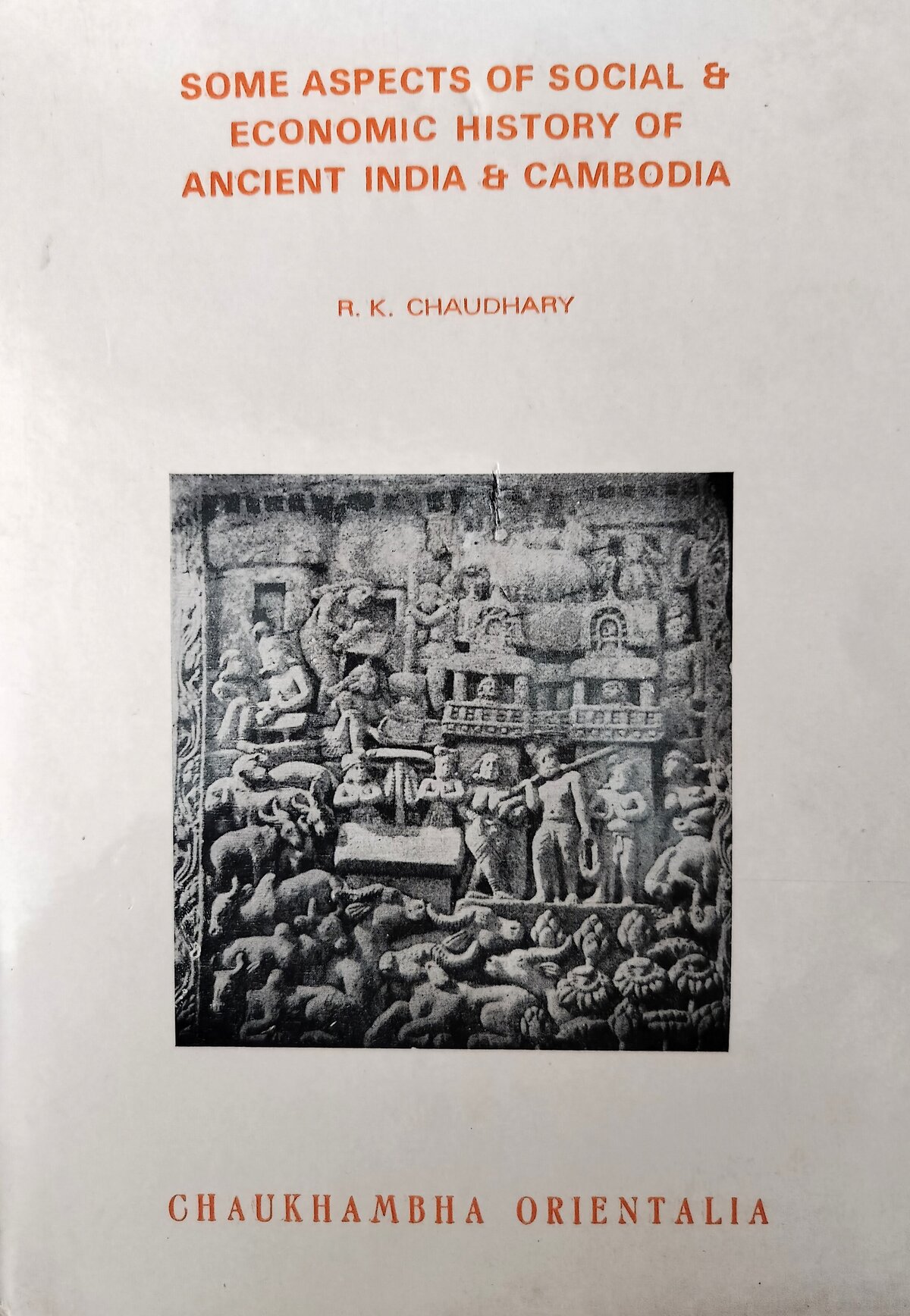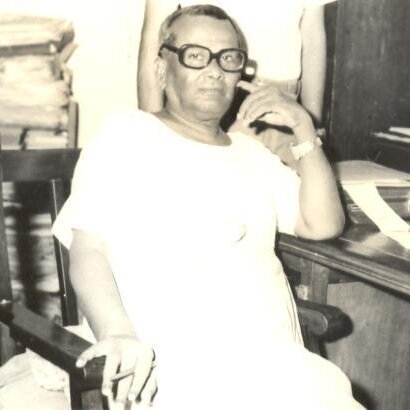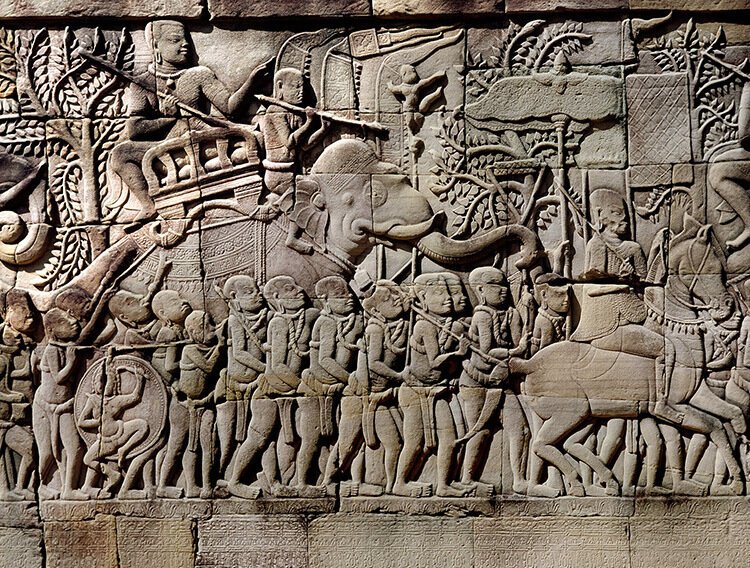Some Aspects of Social & Economic History of Ancient India and Cambodia
by R.K. Chaudhary
A comparative study on social fabric in Ancient India and Cambodia. Focus on "village organization" that stills informs social fabric in Cambodia or Bali today.

- Formats
- ADB Physical Library, hardback
- Publisher
- Chaukhambha Orientalia, Varanasi.
- Edition
- 1st edition
- Published
- 1984
- Author
- R.K. Chaudhary
- Pages
- 394
- Language
- English
Exploring and challenging the Marxist concept of “Asiatic Mode of Production” (AMP), the author gives here novel considerations on social classes, cast system, slavery and forced labor in Ancient India and Cambodia.
Why a Bihar historian did chose Cambodia as the only example out of the subcontinental Indian sphere? Certainly because the Khmer Empire social fabric presented a distinct and telling variation on Ancient Indian social trends. In his sum, the author devoted 2 chapters, 12 and 22, specifically to Ancient and Medieval Cambodia.
In this pdf document, we gathered:
- Chap. 12, Slaves and Serfs in Mediaeval Cambodia (circa 400‑1300 A. D.) [pp 196 – 207] [1]
- Chap. 22, Cambodian Feudal Polity [pp 365 – 8]
- Appendix: Some Typical Administrative Technical Terms as gleaned through the Palm-Leaf Panjis of the Karana-Kayastha of Mithila [pp 369 – 385].
The entire book is available in its print version at Angkor Database Library, Siem Reap.
[1] This chapter had been previously published as a working paper: R.K Choudhary, “Slaves and Serfs in Medieval Cambodia, (circa 400‑1300 A.D.)”, in Proceedings of the Indian History Congress, 1966, Vol. 28, pp. 520 – 531, Indian History Congress, 1966.
Tags: Ancient India, India-Cambodia cultural ties, Indianization, Indian influences, social classes, caste system, castes, slavery, forced labor, comparative studies, India
About the Author

R.K. Chaudhary
Prof. Radha Krishna Chaudhary [sometimes Choudhary] (15 Feb 1924 – 15 March 1985) was an Indian historian and writer, specializing in historical and archaeological studies on Bihar as well as on Maithili literature.
A professor at Ganesh Dutt College, Begusarai, Bihar, he was also a member of the Maithili Adivsory Board at Sahitya Academy. As an educationist and a contributor to the Chatra Samiti in Patna, he emphasized the Bihar origins of the Buddha and Buddhist traditions.
Like many Indian researchers from the 1950s and 1960s, Prof. R.K. Chaudhary approved of some Marxist theory concepts, while noting that the Marxist category of “Asiatic mode of production” was not adapted to Ancient Indian (and Cambodian) realities. He favored Hindi and English for academic work publications, and Maithili for literary contributions.
In the appendix to Some Aspects of Social ... (pp 377 – 8), he offered the following etymology of his family name:
The word originally appears to have been derived from Chaurodharika, a “holder of four” or exterminator of thieves, or Chaurodhatri, or sometimes equated with Chakradharina ( bearer of the discus as a symbol of authority). According to Agarwal, Chaudhary is connected with Caturasika in the sense of eighty-four. He relies on Aparajitaprccha (78. 33 – 34.) which has Caturamasila Samantas or small feudal chiefs enjoying fourth part of the revenue. Sircar tries to connect it with Kannada (Saudore, Saudare, Caudare, Cavudari) and describes it as an officer of the royal guard. Chaurodharnika occurs to the Gupta and Vallabhi records in the sense . of the exterminator of thieves. Chaudhary was a kind of Police Officer meant for suppressing theft and other allied offences or chief of the royal guards. It was an important adjunct in the provincial administrative hierarchy. lbn Batuta mentions the office of Chaudhary. A group of hundred villages was known as Sadi and according to Batuta there were in each Sadi a Chaudhary, a headman of the Hindus, and a Mutashariff who collected the revenue. First mention of the word Chaudhary is found in the reign of Alauddin Khilji. Barni mentions Chaudhary with Muqaddams, Patavaris and other revenue officials. He also mentions Karkuna and Kanungoes. From Barni’s reference it appears that the post of Chandhary existed since the beginning of the Sultanate period. In Mithila the post of Chaudhary came into existence in the reign of Gangadeva. He instituted this post for revenue purposes. Barni holds that a Chaudhary collected revenue. He was chosen by the Muqaddam of the village and according to Qureshi the post of a Chaudhary was both hereditary and elective . He was also connected with the measurement of land and assessment of revenue. From the writings of Vidyapati, it appears that a Chaudhary represented to the Pargana administration the interests and needs of the ryots. They were associated with various types of revenue duties. Under the Mughals, Chaudhary was a royal official connected with the local administration.
Publications
- Maithili Sahityik Nibandhavali. Abhinav Granthagar, Patna. 1950. Maithili
- Sidhharth. Abhinav Granthagar, Patna. 2 ed. 1952. Hindi
- Studies in Ancient Indian Law. Motilal Banarsidas, Patna.1953. ENG
- Bihar — The Homeland of Buddhism. Sidharth Press, Patna. 1956. ENG
- History of Bihar. Motilal Banarsidas, Patna. 1958. ENG
- Select Inscriptions of Bihar. Smt Shanti Devi. 1958. ENG
- Mithilak Sankshipt Rajnaitik Itihas. Vaidehi Samiti, Darbhanga. 1961. Maithili
- Vratyas in Ancient India. Choukhamba Prakashan, Varanasi. 1964. ENG
- “Slaves and Serfs in Medieval Cambodia, (circa 400‑1300 A.D.)”, in Proceedings of the Indian History Congress, 1966, Vol. 28, pp. 520 – 531, Indian History Congress, 1966. reprint as Chap 12 of Some Aspects…, 1984. ENG
- Prachin Bharat Ka Rajnaitik Evam Sanskritik Itihas (1200 Eisvi Tak). Bharati Bhavan Publishers, Patna. 1967. Hindi
- Sharaantidha. Maithili Prakashan, Calcutta. 1968. Maithili
- Vishva Itihas Ki Ruprekha (2 Volumes). Ajanta Press Patna. 1969. Hindi
- History of Muslim Rule in Tirhut (1207 — 1765). Choukhamba Prakashan, Varanasi. 1970. ENG
- Kautilya’s Political Ideas and Institutions. Choukhamba Prakashan, Varanasi. 1971. ENG
- Inscriptions of Ancient India. Meenakshi Prakashan, Delhi.1983. ENG
- Some Aspects of Social & Economic History of Ancient India and Cambodia, Varanasi, 1984. ENG
- Dhammapada — Maithili Translation. Maithii Prakashan Samiti, Calcutta. 1971. Maithili
- A Survey of Maithili Literature, Shruti Publications, Delhi, 2010, ISBN 978−93−80538−36−5
- Mithilak Itihas, Shruti Publication, Delhi, 2010 (in Maithili Language), ISBN 978−93−80538−28−0

